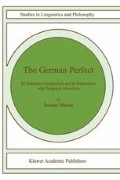Abstract
Our main concern in this chapter are the questions of what functions temporal adverbials can have in simple tense clauses and in perfect clauses, and how temporal adverbials can interact with each other. We will identify possible functions of temporal adverbials and provide evidence that temporal adverbials can indeed take over these functions. Of course this general working strategy does not imply any claims about any particular adverbials, nor does it take into account idiosyncratic properties of adverbials in much detail. We will take it for granted that the classification of temporal adverbials as sketched in chapter 4, and as supplemented by more subtle distinctions in the literature, is well-motivated; that the internal semantic composition of particular temporal adverbials can be captured adequately, and we will assume plausible definitions of the semantic contribution of particular adverbials without arguing for them in detail.
Access this chapter
Tax calculation will be finalised at checkout
Purchases are for personal use only
Preview
Unable to display preview. Download preview PDF.
Notes
Because of the stative nature of perfect constructions and idiosyncratic properties of the present tense, present and future adverbials in present perfect clauses — but not in past perfect clauses — can only serve as specifiers on the tense time level or on the aspect time level, but clearly not on the situation time level of the embedded VP (cf. Musan) (1998, 2000, 2001, and chapter 2 above). Therefore, a present perfect clause makes the intended reading more suggestive.
Since past adverbials in present perfect clauses — but not in past perfect clauses — can only serve as specifiers of the embedded VP-situation time but not as tense time or aspect time specifiers (cf. Musan) (1998, 2000, 2001, and chapter 2 above), the example is unambiguous in this respect.
From May to August Mary ran every day. (Parsons) (1990:211 f)
In 1985 Mary went swimming every morning. (Kamp and Reyle) (1993:635ff)
In ten minutes, Ema buttered each bagel. (Eckardt) (1998:123ff)
Other authors use terms like ‘frame adverbial’ in order to refer to temporal adverbials like yesterday in the following sentence: Yesterday Frank discovered a species with ten legs. Here yesterday provides a temporal frame within which the discovery of the species is located. See, for instance, Fabricius-Hansen (1986).
The example in (4.3b) is taken from the dtv-Atlas zur deutschen Sprache, second edition. München: 1978, p113.
This has also been discussed in von Stechow (1999b: 11ff).
Author information
Authors and Affiliations
Editor information
Editors and Affiliations
Rights and permissions
Copyright information
© 2002 Springer Science+Business Media New York
About this chapter
Cite this chapter
Musan, R. (2002). Interactions with Temporal Adverbials. In: Musan, R. (eds) The German Perfect. Studies in Linguistics and Philosophy, vol 78. Springer, Dordrecht. https://doi.org/10.1007/978-94-010-0552-4_5
Download citation
DOI: https://doi.org/10.1007/978-94-010-0552-4_5
Publisher Name: Springer, Dordrecht
Print ISBN: 978-1-4020-0822-1
Online ISBN: 978-94-010-0552-4
eBook Packages: Springer Book Archive

